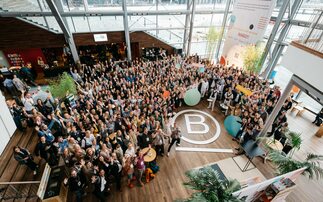The breadth of SDG8's pursuit of sustainable economic growth presents businesses with a major challenge
SDG 8 is one of the broadest-based of the UN's Sustainable Development Goals, encompassing a host of different issues, ranging from modern slavery, child labour and labour rights to gender diversity, green skills, and access to financial services.
It is also one of the most important for businesses to address, given their central role in both job creation and sustainable economic development.
Find your focus
As a result, argues Louise Ayling, director of stakeholder engagement at corporate communications agency Radley Yeldar, "it's important to work out where you should focus within SDG 8 - where are your biggest impacts and where can you can have most influence?"
For a manufacturing business, it might be child labour, safe working conditions, or clean technologies. For a bank, it obviously makes more sense to focus on increased access to financial services and mobilising green investment. Incorporating risks arising from SDG8 into corporate materiality assessments, or processes for identifying salient human rights and environmental issues, will help firms determine where they should focus their efforts.
Be realistic
It is important to be realistic about what businesses can achieve, and by when. Even with the greatest will in the world, companies are not going to be able to eliminate child labour or deliver net zero emissions overnight so they need to decide what is their overall goal, what are their targets to get there and what is the target date? Setting a long term goal in line with the SDGs is important, but if a businesses has committed to going net zero by 2050 it is the interim targets for 2025 and 2030 that are more likely to drive investment decisions now. Once the targets are in place what initiatives, processes, and systems can then be put in place to drive change? And how will progress be measured?
But be ambitious
Nonetheless, being realistic does not mean shirking the challenge presented by SDG8, Ayling says. "Think big," she advises. "The issues within SDG 8 are huge, and can't be tackled with small incremental improvements, or tweaks to business-as-usual. Tackling issues like child labour and modern slavery often requires radical thinking and business transformation, as well as changing mindsets and behaviours. Be prepared to go back to the drawing board, to think of new ways of working, and to flip challenges on their head." Remember, the pursuit of 'sustained, inclusive and sustainable economic growth, [and] full and productive employment and decent work for all' requires nothing short of a complete reimagining of how the global economy currently operates.
Measure your impact - properly
Nor can you get away with vague promises to do better. Firms need to measure their impacts. Many sustainability issues - particularly social issues - tend to be measured using reach and adoptions metrics, rather than measuring detailed impact or outcomes, Ayling points out. Take child labour as an example. A reach metric might measure the number of training sessions facilitated along the supply chain, to raise awareness about the issues associated with child labour. An adoption metric might look at the number of people who've implemented what they've learned in the training. It is easy to see why businesses adopt such metrics given the inherent difficulty of recording what typically amounts to illegal activity, but it is equally easy to see the flaw in such approaches.
"Whilst this method is much easier to implement than measuring impact or outcomes, it's far less meaningful," warns Ayling. "[You should] aim to measure the outcomes or impact of your efforts. Sticking with the child labour example, an outcome metric might measure the number of children removed from child labour and enrolled in school."
Justice matters
One of the biggest challenges presented by SDG8 and the changing nature of work that sustainable development necessitates is the risk of unintended consequences. The phasing out of polluting industries and unsustainable business models raises the prospect of entire sectors and the communities they support falling victim to dwindling investment and mass unemployment and underemployment. History is filled with examples of technology and economic transitions that were poorly managed, left regions and industries feeling abandoned, and unleashed massive social problems as a result.
Emerging plans for a 'just transition' are hoping to identify these risks early as the net zero transition gathers pace and put in place plausible policies that ensure all communities and countries can benefit from sustainable economic growth. Businesses have a critical role to play in supporting and enacting these policies, ranging from academic efforts to find a better way of measuring economic progress to specific initiatives for helping industries and individuals impacted by the transition.
Collaboration is key
No one can deliver SDG8 on their own, so collaboration is crucial, not just within your business and across your supply chain, but also within your sector and even across sectors. One example is Alliance 8.7, a group that seeks to implement measures to eradicate forced labour, modern slavery, and human trafficking around the world (issues specifically identified in SDG target 8.7). The partnership is open to countries, business membership organisations, civil society organisations, stakeholder networks, and academic institutions. Business has a voice through member organisations such as UN Global Compact and amfori.
Similarly, the Maritime Anti-Corruption Network (MACN), a global business network of over 100 companies working toward the vision of a maritime industry free of corruption, has put in place an anonymous reporting system to highlight and combat issues such as bribery and extortion, one example being demands by Argentine port officials for payment to clear grain held in ports in 2014. "After building a coalition of local and global stakeholders, MACN pursued a collective action in Argentina, which resulted last year in the successful adoption of a new regulatory framework for dry bulk shipping," says consultancy BSR. "The new framework increases the integrity and transparency of dry-bulk vessel inspections to the benefit of frontline crew, shipping companies, and the Argentine economy."
Education, education, education
The interlocking promise of sustainable economic growth and decent jobs presents a huge opportunity in the form of the green jobs boom. The International Renewable Energy Agency (IRENA) recently reported that 11 million people now work in the global renewables industry, and employment levels are growing fast. Add the transition towards electric vehicles (EVs), smart cities, carbon capture and storage, and myriad other clean technologies into the mix and the demand for green jobs is set to soar.
However, this also presents a significant challenge for companies and governments looking to deliver on SDG8. Skillsets will inevitably change both within industries - as is the case as auto manufacturing lines re-tool to produce EVs - and with the emergence of whole new industries. Companies that want to avoid skills shortages need to seriously consider how they plan to re-train existing staff, ensure new entrants to the workforce are adequately trained up, make young people aware of the opportunities on offer, and engage the public at large with the transition towards sustainable economic growth.
Go to the top
Make the case to the board for acting on SDG8. It is easy to duck a target that looks so broad and wide-ranging, arguing that it should be the preserve of governments and academics. Moreover, people find it easier to engage with and take action on issues that feel tangible and social sustainability issues, such as modern slavery and child labour, can be hard to relate to because they are often hidden from sight. Environmental degradation in corporate supply chains faces a similar challenge, as many firms are still able to get away with an 'out of sight, out of mind' approach to governance.
"I frequently talk to businesses who declare 'modern slavery isn't an issue for us', or 'we don't use child labour'," Ayling observes. "In reality, this perception is often far from the truth. To make a compelling case to the board, it's important to bring the issues within SDG 8 closer to home, and to make them relatable. If possible, use your materiality assessment or process for identifying salient human rights issues, to highlight the scale of the issues within your business. Pinpoint the real risks that could occur if you don't take action, and quantify the opportunities available to your business if you do."
Companies such as Uber and Deliveroo "have attracted controversy over their reluctance to treat workers as employees, giving them benefits such as sick pay and holiday pay", according to the FT, and have even found themselves battling their own drivers in the courts. For other companies, particularly those in the tech sector, decent work and proper training are important to address skills shortages and position themselves to thrive as the fourth industrial revolution gathers pace.
One way to bring the board around is to engage stakeholders so you can find out their perspectives on your company's approach to managing the issues within SDG8. Demonstrating the extent to which your stakeholders care about sustainable economic growth can be a powerful force for change.







